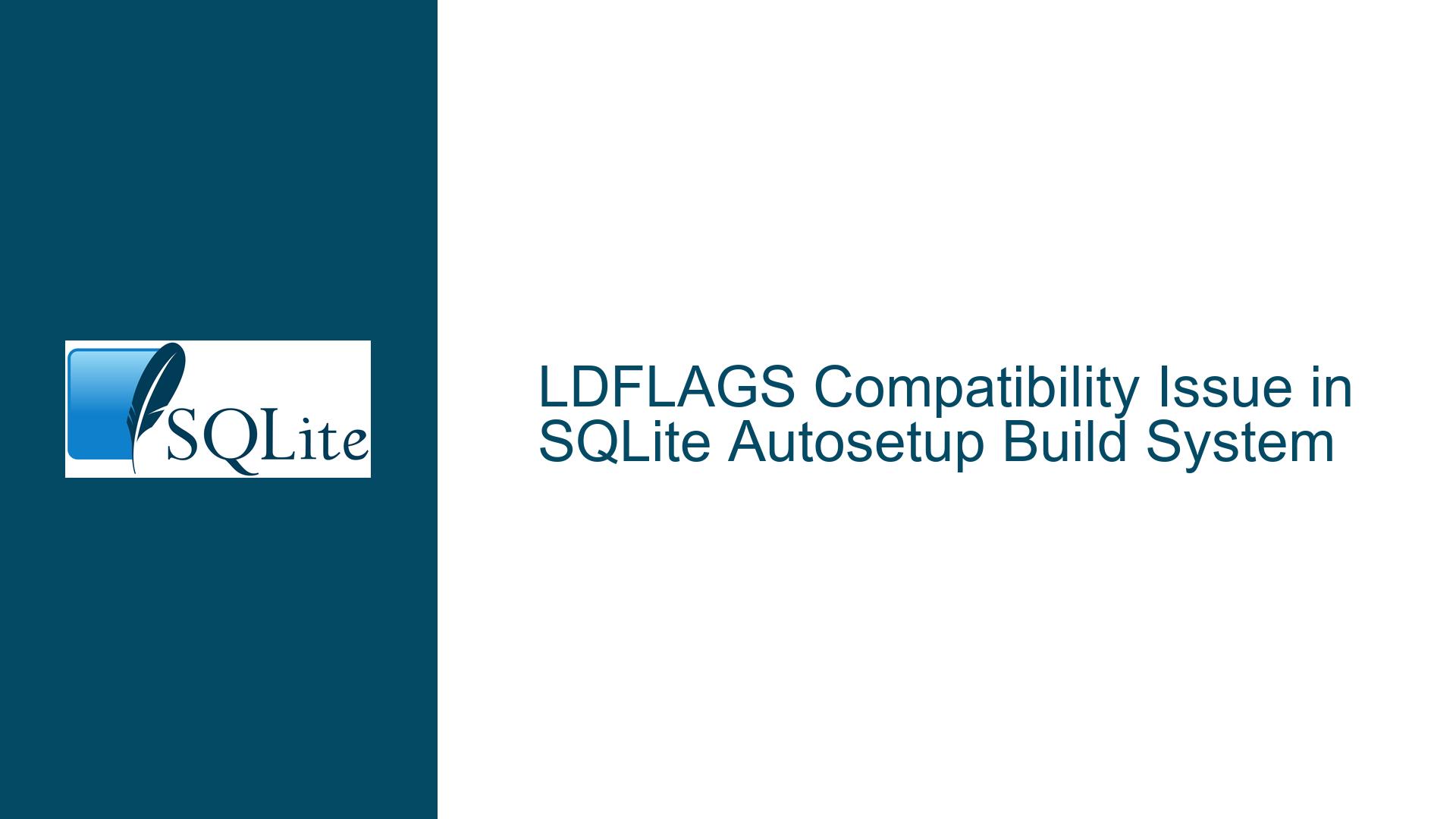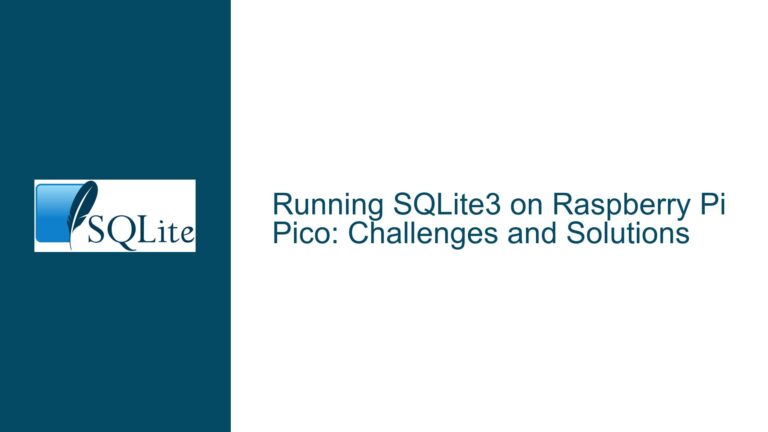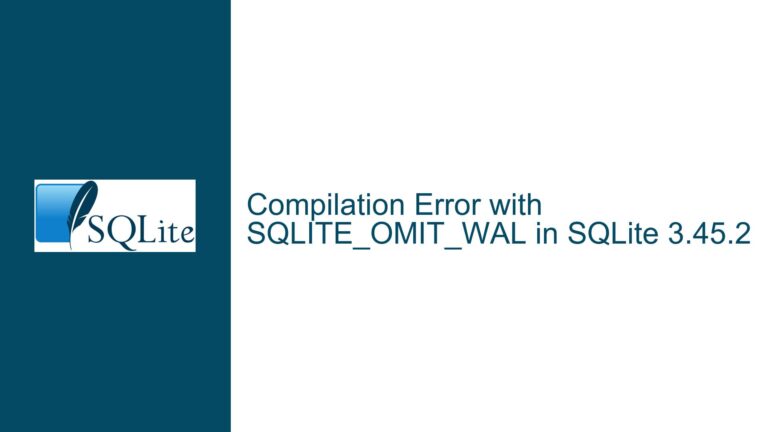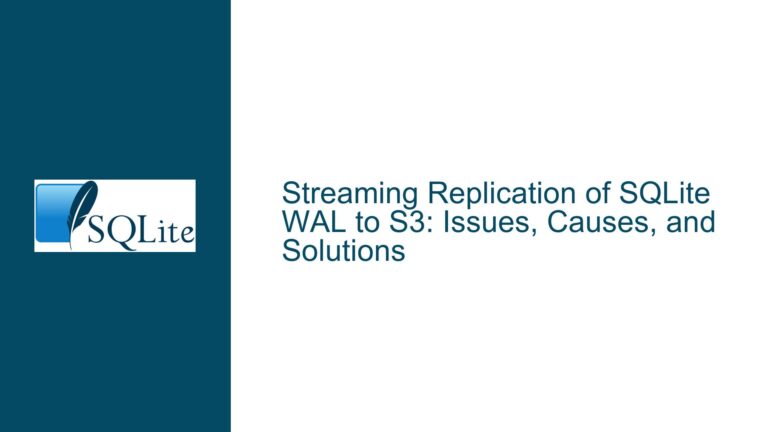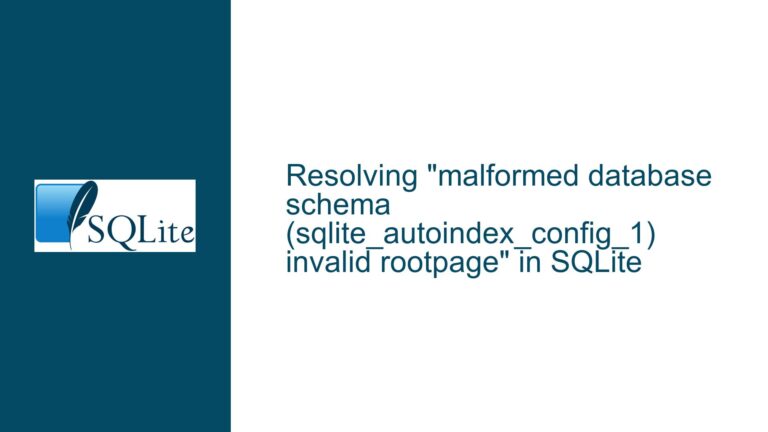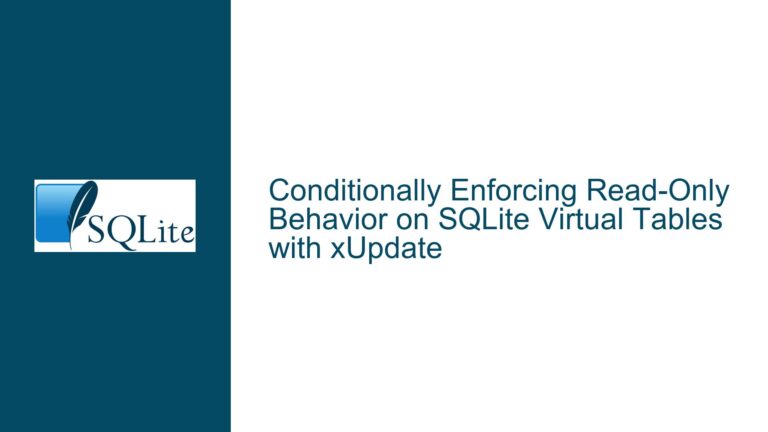LDFLAGS Compatibility Issue in SQLite Autosetup Build System
Issue Overview: LDFLAGS Behavior Change in SQLite Autosetup Build System
The core issue revolves around the behavior of the LDFLAGS variable in the SQLite build system, specifically when using the autosetup configuration tool. Historically, users could pass custom linker flags (LDFLAGS) to the ./configure script, which would then apply these flags globally across all link operations during the build process. This functionality was particularly useful for scenarios such as static linking of dependent libraries, setting minimum OS versions, or specifying custom library paths. However, with the introduction of the autosetup build system in SQLite’s development trunk (post-version 3.47), the global application of LDFLAGS was intentionally restricted. This change has led to compatibility issues, particularly for users who rely on custom linker flags for platform-specific builds, such as those targeting macOS or other Unix-like systems.
The issue is further complicated by the fact that the autosetup build system now applies LDFLAGS more selectively, targeting only specific binaries or libraries that directly link against SQLite’s core source files or the libsqlite3.a static library. While this selective application is intended to prevent unintended side effects, it has inadvertently broken workflows for users who depend on global LDFLAGS settings. For example, macOS users who previously used LDFLAGS to set the minimum OS version or SDK path now find that these flags are no longer applied as expected. Similarly, users on platforms like OpenBSD or Solaris, where custom library paths are often required, are also affected.
The discussion highlights a tension between the SQLite development team’s desire to streamline the build process and the need for backward compatibility with existing build workflows. While the team has reinstated limited support for LDFLAGS in the development trunk, this support comes with caveats. Specifically, LDFLAGS can only be passed to the ./configure script and not to make, and their application is restricted to certain targets. This change has sparked debate about whether the new behavior strikes the right balance between flexibility and maintainability.
Possible Causes: Why LDFLAGS Behavior Changed in SQLite Autosetup
The change in LDFLAGS behavior can be traced to several underlying causes, each rooted in the evolution of SQLite’s build system and the design philosophy of the autosetup tool. Understanding these causes is essential for diagnosing the issue and identifying potential solutions.
First, the transition from the legacy Autotools-based build system to the autosetup system represents a significant shift in how SQLite is configured and built. The Autotools suite, which includes tools like autoconf, automake, and libtool, is known for its flexibility but also for its complexity and platform-specific quirks. By adopting autosetup, the SQLite development team aimed to simplify the build process, reduce dependencies, and improve cross-platform consistency. However, this simplification came at the cost of some Autotools-specific features, including certain platform-specific behaviors like libtool‘s handling of MACOSX_DEPLOYMENT_TARGET.
Second, the decision to restrict the global application of LDFLAGS reflects a deliberate effort to avoid unintended side effects. In the legacy build system, LDFLAGS were applied to all link operations, which could lead to inconsistencies or conflicts when building multiple targets. For example, a custom LDFLAGS setting intended for a specific library might inadvertently affect other binaries or shared objects, potentially causing runtime errors or compatibility issues. By limiting the scope of LDFLAGS to specific targets, the autosetup system aims to reduce this risk.
Third, the SQLite development team has expressed concerns about the maintainability of supporting highly platform-specific build configurations. Features like libtool‘s automatic handling of minimum OS versions or SDK paths are deeply integrated into the Autotools ecosystem and would require significant effort to reimplement in autosetup. Given SQLite’s focus on simplicity and portability, the team has chosen not to replicate these features, instead encouraging users to find alternative solutions for platform-specific requirements.
Finally, the change in LDFLAGS behavior may also reflect a broader trend toward stricter control over build configurations. By limiting the ability to override LDFLAGS at the make stage, the SQLite team aims to prevent scenarios where incompatible flags are applied to different parts of the build, leading to unpredictable results. While this approach enhances consistency, it also reduces flexibility for users who rely on custom build configurations.
Troubleshooting Steps, Solutions & Fixes: Addressing LDFLAGS Compatibility Issues
To address the LDFLAGS compatibility issues in SQLite’s autosetup build system, users can take several steps depending on their specific requirements and build environment. These steps range from adapting to the new behavior to implementing custom build configurations that restore the desired functionality.
First, users should ensure they are working with the latest version of SQLite’s development trunk, as the team has reinstated limited support for LDFLAGS in response to community feedback. This support allows LDFLAGS to be passed to the ./configure script, where they are selectively applied to relevant targets. To take advantage of this feature, users should update their build scripts to pass LDFLAGS exclusively to ./configure and avoid overriding them during the make stage. For example:
export LDFLAGS="-Wl,-macosx_version_min,10.13"
./configure --enable-threadsafe
make
Second, for users who require global application of LDFLAGS, a custom build configuration may be necessary. One approach is to manually modify the main.mk file to include LDFLAGS in the link operations for all targets. This can be done by adding a line like LDFLAGS.global = @LDFLAGS@ to the Makefile.in template and updating the relevant link commands to include this variable. However, this approach requires careful testing to ensure compatibility with all build targets.
Third, macOS users who rely on libtool-specific features like MACOSX_DEPLOYMENT_TARGET may need to adopt alternative strategies. One option is to use a custom wrapper script that sets the appropriate environment variables and invokes the compiler directly. For example:
export MACOSX_DEPLOYMENT_TARGET=10.13
export SDKROOT=/Library/Developer/CommandLineTools/SDKs/MacOSX11.3.sdk
export CFLAGS="-mmacosx-version-min=10.13 -arch x86_64 -arch arm64 -Os"
export LDFLAGS="-Wl,-macosx_version_min,10.13"
./configure --enable-threadsafe
make
Fourth, users on platforms like OpenBSD or Solaris, where custom library paths are required, can work around the LDFLAGS limitations by specifying these paths directly in the CFLAGS or LDFLAGS passed to ./configure. For example:
export CFLAGS="-I/usr/local/include"
export LDFLAGS="-L/usr/local/lib"
./configure --enable-threadsafe
make
Finally, for advanced users comfortable with maintaining a custom build system, it is possible to create a hybrid approach that combines SQLite’s canonical build process with platform-specific tools like libtool. This involves importing SQLite’s core source files (sqlite3.c, sqlite3.h, shell.c) into a custom Autotools-based project and using libtool to handle the build. While this approach requires additional effort, it provides maximum flexibility for platform-specific requirements.
In conclusion, while the changes to LDFLAGS behavior in SQLite’s autosetup build system have introduced challenges for some users, there are multiple strategies available to address these issues. By understanding the underlying causes and exploring the available solutions, users can adapt their build workflows to achieve the desired outcomes while maintaining compatibility with the latest SQLite releases.
